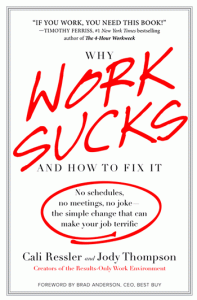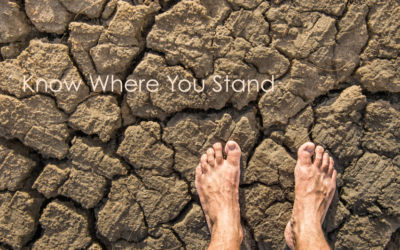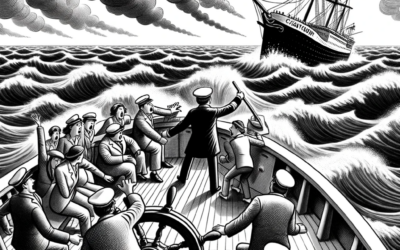 Cali Ressler & Jody Thompson Interview
Cali Ressler & Jody Thompson Interview
Cali and Jody created the Results-Only Work Environment from within the bowels of Corporate America – while juggling families, careers, and all the other demands of life.
Work sucked and the traditional solution–more flexible schedules–wouldn’t address the problem. So they set out to fix it. Today, Cali and Jody are leading a global movement to forever change the way we work and live. For everyone.
Gary Cohen: In your book, Why Work Sucks and How to Fix It, you discuss a process you call ROWE. What is ROWE?
Cali & Jody: In our book, Why Work Sucks and How to Fix It, we explain exactly what a Results-Only Work Environment (ROWE) is. It’s an environment where each person is free to do whatever they want whenever they want, as long as the work gets done. It’s a true adult work environment where measurable outcomes are agreed upon and everyone reaches those outcomes how, when, and where it makes most sense.
What is it that ROWE is not?
ROWE is not telecommuting, flextime, a 4-day workweek, or any other kind of flexibility program. In fact, ROWE is not a program at all. It’s a culture shift in the way we approach work that breaks down the 1950s rules and beliefs that have kept us shackled us for so long.
How does it work?
Currently, there is a cycle that exists in workplaces that continues to keep everything operating as if it were 1950. The cycle consists of 1) the power of time, 2) the beliefs we have about the way work should happen, and 3) judgment. The ROWE migration process breaks this cycle.
The first step involves identifying the language in the work environment that makes judgments about how people are spending their time. We call this Sludge. Sludge might sound like this: “10:00 and you’re just getting in? I wish I could come in late every day”, “Banker’s hours again? Must be nice”, or “There goes Jill to pick up her sick kid again at daycare – wish I had a kid and could get some time off”. During the ROWE migration process, employees learn about an Environmental Sludge Eradication Strategy that they put into practice that rids the environment of this language. That is the catalyst for rewiring our decades-old beliefs about work. The migration process is paced appropriately so that the new order emerges gradually and new ways of approaching work continue to evolve.
What is the mental model you have for ROWE? And how do you transfer that to others?
The mental model we have for ROWE is based in an adaptive change process. It hits at the heart of what people believe about their co-workers, what constitutes ‘dedication’ to an organization, what ‘hard work’ looks like, and more. ROWE throws out the permission-based, childlike, paternalistic environment that exists in so many organizations today and replaces it with an adult environment that’s all about accountability.
We have a finely-tuned 3-phase process that we bring organizations through if they want to become ROWE-approved. We also conduct speaking engagements around the country at conferences, organizations, and universities for people that just want a dose of ROWE to kickstart their own mindsets.
Where did you first introduce this idea?
What was the question you were answering when you decided to lead the change that transpired at Best Buy?
When we decided to lead the change at Best Buy, we were answering this question: “What would the perfect work environment be like – where people could live their lives the way they want to and the organization would be getting maximum productivity?”
What change were you seeking and what modifications were made to your expectations from your initial idea?
With ROWE, we were seeking to create an environment where people could do whatever they want whenever they want, as long as the work gets done. We’ve never made any modifications to that definition because it’s the way things should be! We did, however, create markers to guide people in the right direction – the 13 Guideposts.
What successes and failures have you had with ROWE since you started your new organization? What was the context that allowed for the successes and failures?
More about the ROWE migration process can be found at www.culturerx.com or by e-mailing info@culturerx.com.
Related Blog Posts:
10 Questions to ask to begin a Results Oriented Work Environment – Part 3
13 Guide Posts to a Results Oriented Work Environment – Part 4



